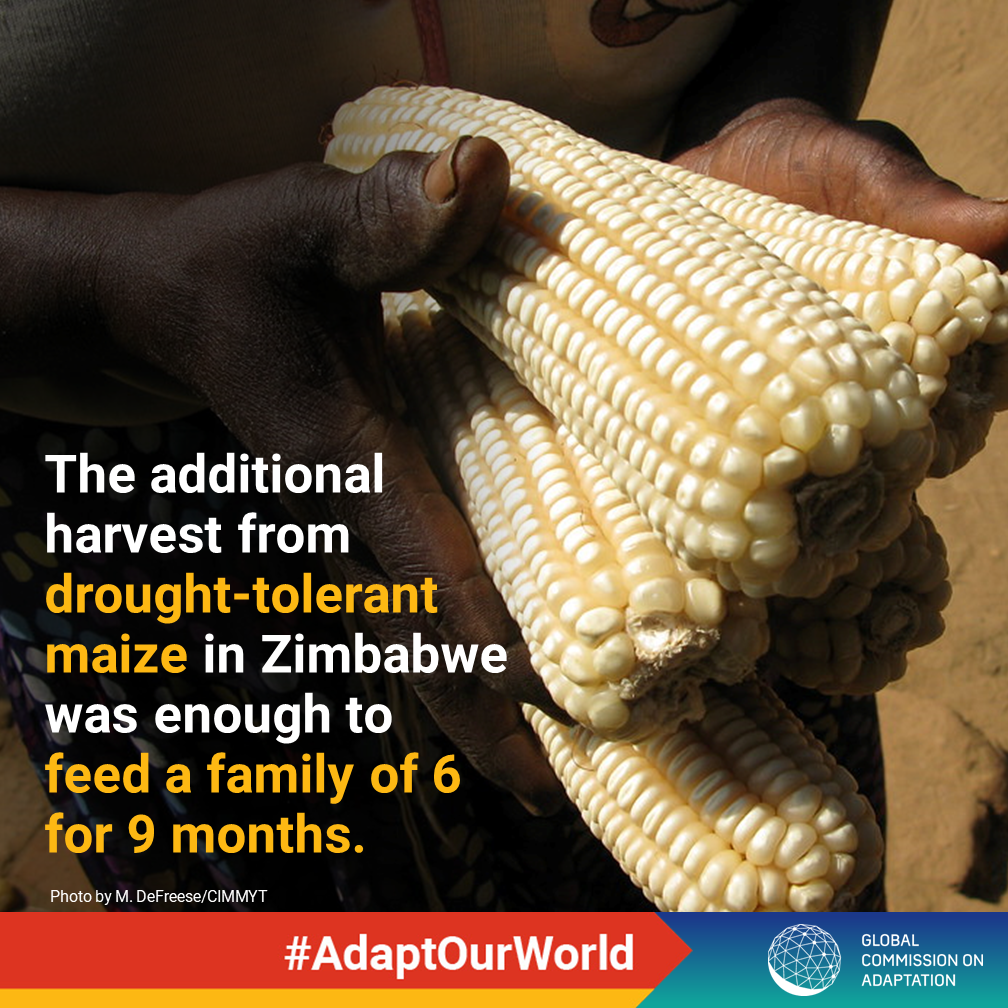Climate-smart innovations can give farmers the tools they need to thrive in a warming world
The global community must mobilise investments that will produce the innovations African farmers need to adapt to climate change.
T
his summer, the Intergovernmental Panel on Climate Change (IPCC) added fresh assessments to the mountain of evidence that climate change is having a major impact on food production—especially in poor regions like sub-Saharan Africa.
According to the IPCC, it’s happening in relatively obvious ways, such as higher temperatures and extreme weather crippling harvests of staple crops like maize and wheat, and reducing livestock productivity. But it’s also having impacts that are less apparent, like rising concentrations of carbon in the atmosphere threatening to deplete crops of key nutrients including protein, iron and zinc.
We also know from the United Nations’ Food and Agriculture Organization (FAO) that climate change is a key reason hunger is now rising around the world – after years of declining. Many now wonder whether climate change will prevent the world from fulling its promise, made as part of the UN’s Sustainable Development Goals (SDGs), to eliminate hunger by 2030.
I was just in Accra, Ghana, where about 2,500 agriculture experts from across Africa and around the world gathered to chart a future that puts the small, family farmers who produce most of the region’s food at the forefront of efforts to reduce poverty, hunger and malnutrition. While they are keenly aware of the threat from climate change, the mood among delegates at the African Green Revolution Forum (AGRF) was refreshingly upbeat, and rightly so.
Ghana, in particular, has seen a decade of agriculture investments contribute to its steady advance from low to middle-income status. Agriculture also has been a key force transforming Ethiopia from the third poorest to one of the world’s fastest growing economies. And agriculture-led growth has been driving dramatic reductions in poverty in Rwanda as well.
But the optimism on display at the form was often tempered by a clear sense of unease, a concern that climate change looms as a spoiler to Africa’s hopes of following in the footsteps of countries like South Korea, China and Vietnam, where massive reductions in poverty started with major investments in smallholder farmers.
Adaptation blueprint
Will climate change rob Africans of this same opportunity? It won’t, but only if the global community can mobilise investments that will produce the innovations African farmers need to adapt.
A new report from the Global Commission on Adaptation (GCA) offers an urgently needed blueprint for helping vulnerable populations like African farmers adapt to climate change. The GCA is chaired by former UN Secretary General Ban Ki Moon, World Bank CEO Kristalina Georgieva and Bill Gates. On a fundamental level, this commission views adapting to climate change as both a moral imperative and a practical endeavor, one that will make our communities safer and stronger and capable of achieving steady economic progress.

The GCA’s plan for poor farmers is relatively straightforward. It identifies a series of specific interventions, like increasing investments in agriculture research and accelerating efforts to develop drought-tolerant and other so called “climate-smart” crop varieties. There is an abundance of evidence that such actions could help farmers overcome basic climate challenges, like heat and water stress.
Just look at new varieties of drought-tolerant maize emerging from the CGIAR network of international agricultural research centers. Even in drought-prone areas like Machakos County in Kenya, farmers who plant these varieties are reporting a healthy harvest. That could be a game-changer on a continent where maize is the most important food crop yet climate change could cut yields of existing varieties by anywhere from 20 to 50 percent.
The GCA’s work is critical for moving adaptation from the margins to the main stage of the global battle against climate change. In about a week, world leaders will gather in New York for a much-anticipated Climate Action Summit. The GCA’s work offers them a firm foundation for launching an international movement focused on adaptation.
For too long now, gatherings like this have focused almost exclusively on supporting efforts to reduce or “mitigate” greenhouse gas emissions. That’s critical. But we also need to support adaptation for people like smallholder farmers in sub-Saharan Africa, who are among those who have contributed the least to climate change but are suffering the most.
We are not helpless in the face of this daunting challenge. With strong global support for adaptation, the world can empower African farmers with a surge of climate-smart innovations that will help them create wealth where there is poverty. And I am confident they will be eagerly embraced.
Early in my career I worked in microfinance in Malawi and saw it rapidly evolve to include innovations like biometric smart cards and mobile banking. I also remember when telephones were a rare sight in rural African households. Now almost every farmer you meet has a phone in her pocket.
If we take heed of the ominous warnings in the latest IPCC report – but also take hope from the optimism I saw in Accra – those farmers could soon be carrying a packet of climate-smart seeds as well.
The ideas presented in this article aim to inspire adaptation action – they are the views of the author and do not necessarily reflect those of the Global Center on Adaptation.